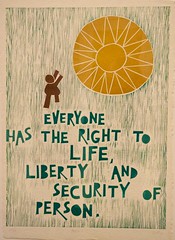 Image by Jordan Lewin via Flickr
Image by Jordan Lewin via Flickr
New Thought, Ancient Wisdom For a Modern Age by M. Daniel Walsh
Ancient Origins
In order to grasp the scope of just how old this movement is, it's probably best to start right at its origins, Ancient Egypt. Now, this may shock some people, but historians and modern Egyptians agree: the Pyramids weren't built by slaves, nor was the foundation of the great Egyptian culture based on slavery.
The whole culture, along with all its massive implications was built atop the same principles we now call "New Thought Principles." The big difference being, they were originally called, "The Th'out Principles" long before we ever added the word new to them. Th'out was an ancient Egyptian man/deity who set forth a set of guiding principles upon which the bulk of western culture has been formed.
Permit me to explain, unlike Adam Smith who taught "Self interest is the highest interest," Th'out taught that, "Creating the most good for the most possible people results in the most good for you." In simple terms, giving precedes receiving.
That simple concept is the cornerstone of the lessons he laid forth. So how did that one simple idea build the pyramids and civilization as we know it?
The Most Possible Good
Northern Egypt has some very fertile lands. But every year, for almost half the year those lands get flooded and farmers get displaced with no place to farm but the barren dessert. Imhotep (a student of Th'out) presented the Pharaohs with a plan: They would store grain all year long in massive stone warehouses, then once the floods came all the people would migrate to the city and wait until the waters subsided.
You see, "The most possible good for the most possible people" was the source of this idea of storing and sharing grain on such a massive scale. When the farmers had tried to store enough for just themselves, the system became too unstable, but when organized into a collective, there was actually more than enough for everyone and Egypt became the largest food exporter in the early world providing even the grain upon which Rome was built!
Here's where it get's interesting:
- Roads: In order to transport all that grain and all those people, roads and other new technologies needed to be developed. Within a short time all of northern Egypt became a tightly interconnected civilization.
- Cities: With all those people migrating to the center each year, housing grew, culture was shared, art Flourished, and the first major cities of the western world emerged.
- Pyramids: But what do all the farmers do with half a year off? Massive projects were created including temples, libraries, and of course the world famous pyramids!
A simple idea of trying to find the most possible good for the most possible people and voila! From the desire to care and nurture the Egyptian people came one of our civilizations first, largest, and most influential accomplishments.
The Accomplishment wasn't the Pyramids...
The Pyramids are an easy to see testament to the prowess of these principles. But the real accomplishment was an idea, a new way of viewing each other. This idea manifested as the notion of a proper written Constitution of Rights guaranteed to all.
For us in the modern era, nearly every country around the world has some form of constitutional rights. These are the guarantees societies make to their members. Before Th'out there is no record of any formal constitution ever written.
The principle he set forth nearly 5,000 years ago gave rise to the very idea of having human beings organizing together to guarantee each other certain agreed upon rights and privileges well beyond the old standard of: "Might Makes Right."
The Modern New Thought Era
Over those 5,000 years many of these constitutions have strayed very far from the original principles of human equality he set forth. But recently, in 1948 the United Nations passed the "Universal Declaration of Human Rights" which represents the first truly global constitutional of human rights.
Article 1 of the Universal Declaration of Human Rights states: "All human beings are born free and equal in dignity and rights.They are endowed with reason and conscience and should act towards one another in a spirit of brotherhood."
Imagine our world with its modern technology and tools all working together as a global community in the spirit of kinship, dedicated to the betterment of all. This is no small group adopting this declaration either. Leaders from the 192 nations comprising the United Nations have ratified this constitution as the guiding principle for the next era of humanity...
It may take some time before 100% of the planet recognizes and agrees that the best results will come from all us working together in a spirit of kinship, but what an amazing time it will be!
Welcome to the Modern New Thought Era!
End Note: The Universal Declaration of Human Rights is listed in the Guinness Book of World Records as the single most translated document in the world!
To learn more visit: New Thought Ancient Wisdom.
The author, M. Daniel Walsh is an avid leader within the New Thought Movement who specializes in teaching others how to get Real World Results using New Thought Concepts. He now offers a completely free mini-version of the New Thought Practicals Strategy School at: http://www.new-thought-center.com.Article Source: http://EzineArticles.com/?expert=M._Daniel_Walsh
http://EzineArticles.com/?New-Thought,-Ancient-Wisdom-For-a-Modern-Age&id=2525945
http://thezeitgeistischanging.blogspot.com/
http://psychedelichippiemusic.blogspot.com/
http://psychedelichippiefashion.blogspot.com/
http://www.soul-flower.com/Merchant2/merchant.mvc?Screen=SFNT&Store_Code=SOS&AFFIL=Robert_Muller
![Reblog this post [with Zemanta]](http://img.zemanta.com/reblog_e.png?x-id=261fc941-78e8-4b01-b71b-047cd84033f2)
No comments:
Post a Comment